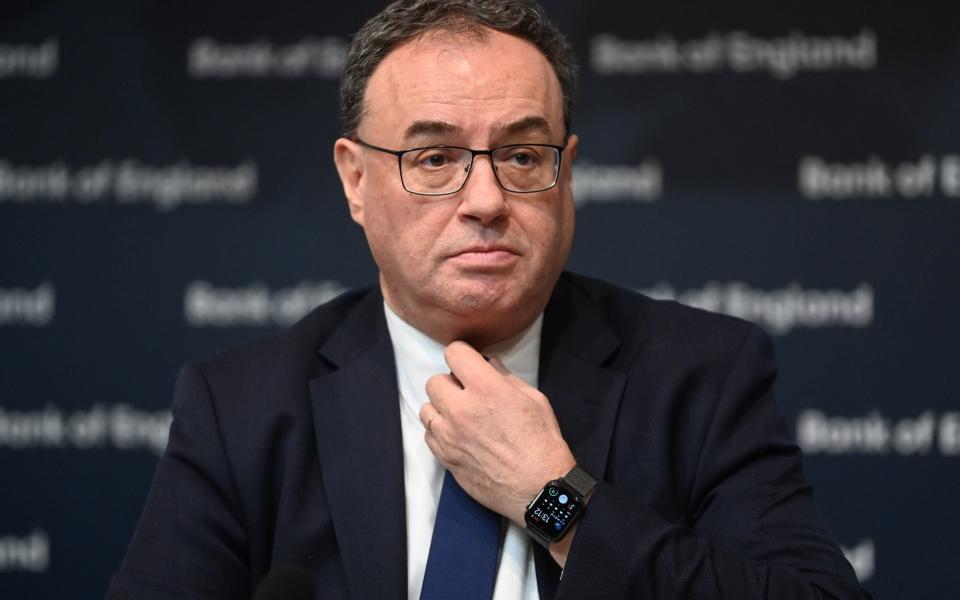Andrew Bailey hits out at post-Brexit reforms to protect City

Post-Brexit financial reforms intended to bolster the ailing City will increase the risk of insurance firms going bust and potentially leave taxpayers with a multi-billion pound bill, Andrew Bailey has warned.
The Governor of the Bank of England told MPs that changes to the so-called Solvency II rules governing investments by the insurance industry increased the "probability of failure" by a fifth.
Insurers have embraced the overhaul of Solvency II, which will allow them to plough £100bn more into the UK economy by investing in higher-risk assets such as green energy infrastructure.
But Threadneedle Street is locked in a tussle with the City and Treasury over the speed and scope of post-Brexit rule changes. The Bank finally said last month that it will publish a roadmap on how new rules will be adopted by the end of this year.
Mr Bailey told MPs on the Treasury Select Committee that relaxing Solvency II capital buffer rules will free up £14bn over a one-year period but increase the probability of an insurer failing from 0.5pc to 0.6pc – an increase of 20pc.
Responding to a series of questions from the committee's chairman Harriett Baldwin, Mr Bailey said "less than half of this increase would have occurred" if the PRA's more cautious recommendations on risk exposures had been adopted.
It comes amid fears of an exodus by major companies from the City of London because of a lack of UK competitiveness.
Andrew Griffith, the City Minister, has vowed to "go further" with post-Brexit deregulation to protect London's status as an international hub if needed, following a decision last week by the UK microchip maker Arm to float in New York.
The Prudential Regulation Authority (PRA) has been accused by MPs and the City of dragging its heels on rule changes and being too conservative about its approach to regulation in a lengthy dispute since the UK voted to leave the European Union in 2016.
Mr Bailey previously warned that post-Brexit liberalisation risked triggering a scandal that could leave insurance policyholders nursing losses on a scale similar to the disaster that struck savings company Equitable Life in 2000.
Mr Bailey said that this scandal had cost policyholders between £4bn and £5bn, with the Government announcing a £1.5bn compensation package in 2010.
Mr Bailey said in Monday's letter that the failure of a "large insurer" would result in unknown costs to the industry and "public purse".
While initial compensation payments would be funded by the Financial Services Compensation Scheme (FSCS), which is bankrolled by the financial services industry, "other potential costs" could arise from the size of the bailout required and how many firms were affected.
Failures that "coincide with wider disruption in the financial sector or the real economy" would make it "difficult to predict the quantum of losses, nor is it certain that it would be limited to a single firm", Mr Bailey said.
The industry hit back at assertions by Mr Bailey that reforms would put the financial system at risk.
A spokesman for Phoenix Group, one of the UK's biggest pensions and savings providers, said the reforms were critical for boosting UK growth and investment.
He said: “Solvency II reforms will be critical in enabling significantly more investment in productive assets, including infrastructure, social housing and green technology.
"At the same time, we fully expect that the regulatory regime will remain highly prudent with policyholder protection remaining the key priority for Phoenix.”
Mr Bailey also said the recent increase in interest rates was likely to spur a flurry of pension fund buy-outs, where corporate pension schemes transfer responsibility for monthly payments to insurers once they reach a certain funding level.
In a further blow to London, the tech company WANdisco on Monday confirmed plans for a secondary listing of its shares in the US.
The business, which has a market value of £875m and is a constituent of London's Aim junior stock market, is a key player in the so-called internet of things where devices from factory production lines to kettles are connected to wifi. Its operations are split between Sheffield and California.
WANdisco said: "As a dual UK and US headquartered technology company, WANdisco has long-stated its intention to consider an additional listing of its ordinary shares in the United States."

 Yahoo Finance
Yahoo Finance 